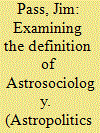|
|
|
Sort Order |
|
|
|
Items / Page
|
|
|
|
|
|
|
| Srl | Item |
| 1 |
ID:
193471


|
|
|
|
|
| Summary/Abstract |
The search for intelligent life elsewhere in the universe has continued for decades without yielding any tangible results, as experts debate active versus passive approaches and the risks involved in sending signals of humans’ presence.
|
|
|
|
|
|
|
|
|
|
|
|
|
|
|
|
| 2 |
ID:
157162


|
|
|
|
|
| Summary/Abstract |
Whether we are alone in the universe is one of the greatest mysteries facing humankind. Given the >100 billion stars in our galaxy, many have argued that it is statistically unlikely that life, including intelligent life, has not emerged anywhere else. The lack of any sign of extraterrestrial intelligence, even though on a cosmic timescale extraterrestrial civilizations would have enough time to cross the galaxy, is known as Fermi's Paradox. One possible explanation for Fermi's Paradox is the Zoo Hypothesis which states that one or more extraterrestrial civilizations know of our existence and can reach us, but have chosen not to disturb us or even make their existence known to us. I propose here a proactive test of the Zoo Hypothesis. Specifically, I propose to send a message using television and radio channels to any extraterrestrial civilization(s) that might be listening and inviting them to respond. Even though I accept this is unlikely to be successful in the sense of resulting in a response from extraterrestrial intelligences, the possibility that extraterrestrial civilizations are monitoring us cannot be dismissed and my proposal is consistent with current scientific knowledge. Besides, issuing an invitation is technically feasible, cheap and safe, and few would deny the profound importance of establishing contact with one or more extraterrestrial intelligences. A website has been set up (http://active-seti.info) to encourage discussion of this proposal and for drafting the invitation message.
|
|
|
|
|
|
|
|
|
|
|
|
|
|
|
|
| 3 |
ID:
103925


|
|
|
|
|
| Publication |
2011.
|
| Summary/Abstract |
A void has existed within the social sciences for over fifty years since the launch of the first Sputnik satellite in October 1957. This void delineates the boundaries of a missing field, a discipline capable of focusing on the relationship between social life and outer space. It is true that social scientists have pursued space issues over the last thirty years or so. As individuals, they have participated in the areas of search for extraterrestrial intelligence research, astrobiology, space policy, and space history. The strength of astrosociology, however, lies in its formalization of this type of approach into an identifiable field of study, which allows for a more organized and inclusive opportunity for participation. As a starting point, one may express the relationship between social life and outer space as astrosociology. One can define astrosociology as the study of social, cultural, and behavioral patterns related to outer space. The purpose of this article is to provide a general framework for more precise language concerning the definition, scope, character, and future development of astrosociology, while simultaneously attempting to elicit a broader discussion of astrosociology's association to other disciplines. It suggests how the various fields and disciplines associated with astrosociology as a multidisciplinary field can work together to build a missing body of knowledge from their related literatures and contemporary research.
|
|
|
|
|
|
|
|
|
|
|
|
|
|
|
|
| 4 |
ID:
114247


|
|
|
|
|
| Publication |
2012.
|
| Summary/Abstract |
Astrobiology, as its prefix suggests, is inextricably linked to space exploration. From the onset of the space age, space agencies discovered the need to take into account the question of protection: protection of planetary bodies; protection of the samples brought back from space; protection of spaceflight crews; and the extent to which spaceflight crew members should be treated as samples. Astrobiology also provides for the renaissance of space exploration and serves as a manner for our societies to confront a fundamental unknown of the cosmos: how we can prepare for encountering extraterrestrial life forms.
|
|
|
|
|
|
|
|
|
|
|
|
|
|
|
|
|
|
|
|
|